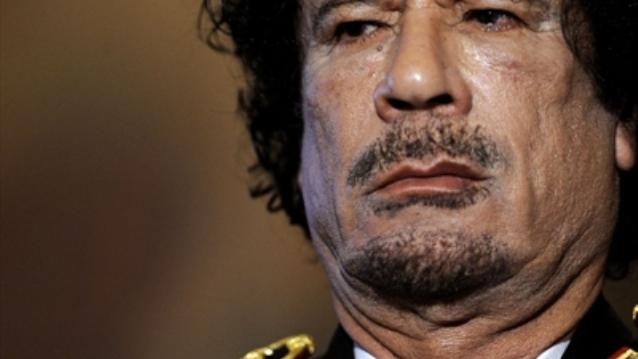
The launch of Western military operations to implement UN Security Council Resolution 1973 is long overdue, but nonetheless welcome: After weeks of delay, brutal attacks by the regime, and a loss of momentum for the rebellion, Colonel Gaddafi’s counter-revolution might now be halted.
The long delay by the West was intolerable. For two weeks, Gaddafi’s forces relentlessly attacked his own people while the United States, NATO, the EU, and UN were unwilling to act. Genuine efforts to stop Gaddafi began only hours before he would have crushed the rebellion in Benghazi. But now, Britain, France, and US may have finally decided that Western values and interest must align as they respond to the changes sweeping the Middle East.
But Western powers must still confront a key strategic question: What is the objective of the airstrikes and the no-fly zone? Is our objective limited to enforcing a no-fly zone to relieve humanitarian suffering? Is it to freeze the situation on the ground? Is it to give support to the rebels so they can remove Gaddafi from power? And, if the latter, what level of military support will the West provide to help the rebels?
UNSCR 1973 calls for protecting the people of Libya, yet is silent about removing Gaddafi. This may have been necessary to secure passage of the resolution – gaining abstentions from Moscow, Beijing, and even Berlin. It may also be helpful to Washington, as it allows the United States to be “for” the resolution, yet vague about the level and duration of any US military engagement.
What happens if Qaddafi stays in power?
At present, the Western coalition appears to be hewing closely to this humanitarian goal. Yet such limited action would miss a larger point: If Qaddafi remains in power, he will outlast the will of the international community, reconsolidate his regime, work on the ground to undermine the opposition, and sow the seeds of a new humanitarian crisis yet to come.
That alone would guarantee a continuing disaster for the Libyan people. But the consequences would extend far beyond Libya. Other dictators would absorb the lesson that a tyrant willing to use force against his own population eventually can succeed – even in the face of a UN Resolution and opposition by key Western countries. This would deliver a major blow to those in the Arab world seeking to build a new, more democratic and just future. Moreover, Qaddafi has promised to attack the interests of those states now implementing the UN Resolution – a renewal of Libyan state-sponsored terrorism.
The sooner the West adopts a clear position that the UN’s humanitarian goals can only be achieved by Gaddafi’s removal from power, the sooner the crisis can begin to come to an end.
Removing Gaddafi will not easy. A no-fly zone implemented a few weeks ago could have saved more lives and kept the momentum with the opposition. Today, momentum needs to be regained. Those senior officers and officials who might have been convinced to abandon Gaddafi have now been forced to defend him. Qaddafi has consolidated the forces at his disposal, and weakened the rebel opposition.
West must support rebels, not intervene directly
Direct intervention by Western troops on the ground in Libya should be avoided. It was Libyans who rose up to take back their country and they must remain in the lead. The West’s role is to support them, not intervene on its own.
Yet within this framework, the West should immediately take several additional steps to support the rebels: Provide intelligence and secure communications equipment; jam Gaddafi’s own communications; implement the “no-drive” zone to blunt Qaddafi’s ground attacks; give non-lethal supplies and logistical support; and, if requested, provide military equipment, ammunition, training, and advisers.
NATO will not take on these missions. Despite the ambitious rhetoric of NATO’s new Strategic Concept, the reality is that NATO acts only by consensus, and no consensus exists for such measures in Libya. For example, Germany abstained from the UNSC Resolution, and Turkey has opposed the no-fly zone.
Moreover, there is no reason why we could not continue as a coalition operation run out of a headquarters in Italy or France. Afterall, “handing off” to NATO really only means handing off to ourselves. At best, NATO may be able to agree on non-lethal measures to support the coalition effort (though even such a limited role could set a valuable baseline for further NATO engagement down the road).
Italy has now offered to have operations run out of Naples, and is contributing eight fighter aircraft. Although it was initially reluctant to oppose Gaddafi, with a UN resolution and its implementation underway, Italy clearly understands the stakes and wants to side with its Western allies. This stands in contrast to Germany, which remains stuck in passivity – making it impossible for the EU to have a common position, and undermining Germany’s own bid for a permanent UN Security Council seat.
With the decision to implement the UN’s call for a no-fly zone, Western engagement to support the Libyan opposition is just beginning. Now the challenge is to set a clear objective to support the removal of Qaddafi, and take decisive steps to help those who will bring that about.
Kurt Volker is a former US ambassador to NATO. He is now senior fellow and managing director of the Center for Transatlantic Relations at Johns Hopkins University’s School of Advanced International Studies, a senior adviser at McLarty Associates, and a senior advisor at the Atlantic Council. A version of this essay originally appeared in Italy’s La Stampa newspaper and the Christian Science Monitor.
Image: muammar-gaddafi.jpg
